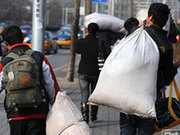China eyes migrant workers for consumption

 0 Comment(s)
0 Comment(s) Print
Print E-mail CNTV, August 29, 2012
E-mail CNTV, August 29, 2012
The global economic recession is pressing all countries to find ways to boost consumption. China is now eyeing the potential of hundreds of millions of migrant workers across its cities.
But the government warns that the country must now raise their social status and give them equal access to public services, if it wants to achieve this goal.
Keeping up with the latest trends, Da Yong, a migrant worker and a rural high school drop-out, is struggling to remain fashionable. His pay day is often spent in downtown shopping malls. A fancy wallet, a shiny watch, paid by a new credit card, today he's got a tablet computer. The young migrant is placing brand names well above his living condition.
 |
|
China is now eyeing the potential of hundreds of millions of migrant workers across its cities. |
Da Yong said, "It's a 5-square-meter basement. Half of the room is occupied by the bed. And when it rains, the water may leak from the roof. But I've been living here for the past ten years. I can't afford a better one."
Despite his poor living condition, Da Yong managed to buy a new ipad and iphone, and a counterfeit Gucci handbag. He said, "If I run out of money, I borrow some from my friends. But now it's easier, because I've got a credit card."
With the economy booming in Beijing, migrant workers are flocking to the city to seek job opportunities. After getting their salary, the young generation may not hesitate to go on a spending spree. But, the older generation has a different way of spending their money.
Xing Libin has a wife and two children back in his rural hometown.
Xing Libin, migrant worker, said, "No one is working on farmland at home any more. Every month, I have to send my money back to the family. They all need that to make a living."
A cheap canteen dinner is probably his only consumption in Beijing. Beer is a rare luxury saved for big celebrations. And today, it's for his first time on TV.
Across China, there are over 200 million migrant workers like them. That's one out of ten of the total population. Most of them are doing the most basic but labor-intensive jobs, with very low wages. An annual report from the population commission says leveraging their purchasing power would significantly boost the country's consumption.
Qiu Huanguang, associate professor of Center gor Chinese Agricultural Policy, said, "That is way harder to be done than it is said. They may impulsively buy a new, expensive cellphone, but that's not sustainable purchasing power. To really boost these people's consumption, we need to free them from the worries, such as the lack of pension, medicare, and educational resources."
The two generations, young and old, may look differently at their ways of spending, but they share the same worries about their future.






Go to Forum >>0 Comment(s)